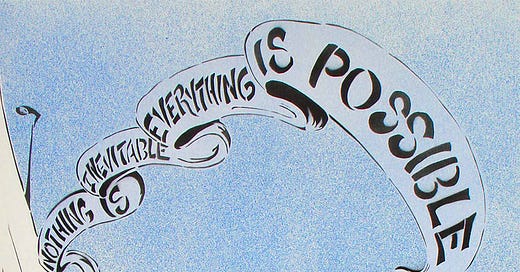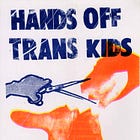Nothing is inevitable
The only thing that's certain is that we have to fight for the world we want
I’ve been thinking about the word inevitable a lot this past week. For many of us who ride New York City’s subways, the tragedy of Jordan Neely’s murder was heartbreaking and somehow unsurprising at the same time. We’ve watched as the city and state have chosen policing and incarceration over housing and health again and again. In conversations with friends this weekend, many of us admitted that the energy on the subway since COVID has been intense. Some friends avoid taking the subway as much as possible. Jordan’s death, in many ways, felt like the logical conclusion of years of dehumanizing and discarding the most vulnerable citizens of the city. But it didn’t have to be. And more suffering is not inevitable.
On Saturday, I read a firsthand account of tenant organizing in Kansas City written by activists from KC Tenants. I highly recommend this inspiring and candid story about the fight to end evictions in Kansas City. One passage, in particular, stayed with me:
Each tenant meeting begins with a meditation on inevitability. We consider what can feel inevitable — rent increases, unfair leases, moldy bathrooms, luxury apartments replacing our childhood homes. Every week we say, “None of this is inevitable, not if we organize.” This section of the meeting is part pronouncement and part prayer; some weeks we believe it, and other weeks we hope for it to be true, reminding ourselves that another world is possible if we are willing to fight for it.
If Jordan’s death felt brutally predictable, then we can imagine the city’s next responses. More police. More involuntary institutionalization of mentally ill people. No new resources for housing, social workers, or bystander and de-escalation trainings. The words of the KC Tenants organizers remind us that nothing is foregone unless we refuse to fight.
This is essentially the same message that Mariame Kaba espouses when she describes hope as a discipline. In a recent interview with Kelly Hayes, Kaba put it this way:
“Something about rooting your hopes in action makes you feel less helpless. It makes you feel less acted upon…. I believe very strongly that our present actions matter, even though we don’t have an idea of how the future is going to turn out.”
I am so grateful to Mariame Kaba for this teaching. It is one that I struggle to remember, but when I do, it rarely fails me. On Sunday, I joined with members of Jews for Racial and Economic Justice, my organizing home, to talk to people outside the Brooklyn Museum. It was a beautiful spring day, and everyone was in a good mood. When I interrupted people going about their day, they were unusually receptive. I did not speak with people about Jordan Neely’s death, but I did speak with them about the mayor’s budget.
The mayor’s austerity budget plans to cut from schools, 3-K programs, CUNY, and many other essential services. The NYPD, who recently received a $5.5 billion raise in their new contract and have already blown past their 2023 overtime budget, is facing no cuts. The Department of Corrections is receiving 50% more in this budget, for a total of $1.2 billion. More cops, more cages. Less money for jobs, housing, health, and education. Many people were shocked and angry to learn about the mayor’s plan. But few people were surprised. Mayor Adams has been very consistent in his stance on the city budget. People were genuinely grateful when I offered them a way to fight back. It was a simple, 2-minute action, writing their city council members.
I don’t know if we’ll win this budget fight. In fact, based on experience, I think it’s very likely we’ll lose. But I know two things (with gratitude to Mariame Kaba and many other experienced organizers): We will definitely lose if we don’t fight. And even if we lose this fight, we may gain a lot in the process of losing. We may learn valuable lessons. We may get closer with members of our community who we fight alongside. We may build new relationships and alliances that will make us stronger for the next fight.
I want so badly to believe that a world where everyone is housed and fed is inevitable because it is what we need and deserve. I know that it is not.
More often, I feel myself succumbing to hopelessness. Lately, each week seems to bring a barrage of heartbreaking news. The sheer amount of it can make the triumph of greed, exploitation, and suffering seem inevitable. But it’s not. Not as long as we each find a way to fight back alongside others who care.
Other Recent Writing
"Educating the Whole Child", U.S. News & World Report
Other Recommendations for Reading, Listening, Watching
“NYC Schools Handcuff and Haul Away Kids in Emotional Crisis” by Abigail Kramer





